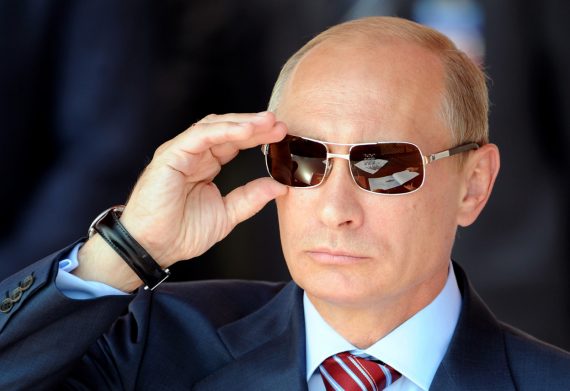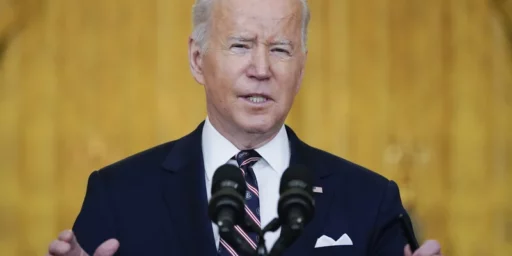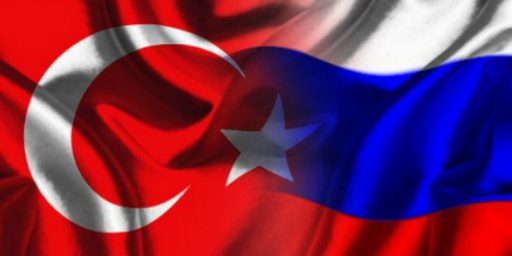Vladimir Putin “Wins” “Election” For Fourth Term In Office
To nobody's surprise, Vladimir Putin has won re-election to another term as Russia's President.
To the surprise of absolutely nobody, Vladimir Putin was overwhelmingly re-elected to a fourth term as Russia’s President:
MOSCOW — Russian voters gave President Vladimir V. Putin resounding approval for a fourth term on Sunday, with nearly complete figures from the Central Election Commission showing him winning more than three-quarters of the vote with a turnout of more than 67 percent.
The Kremlin had initially projected that Mr. Putin would get at least 70 percent of the vote with a 70 percent turnout, and the results with 99.84 percent of the ballots counted were in line with that assessment.
Mr. Putin won 76.6 percent of the vote, and the turnout of 67.47 percent was higher than the 65 percent participation rate in the last presidential election, in 2012. More than 56 million of Russia’s 110 million eligible voters backed Mr. Putin.
A poor showing by the already fractious opposition prompted a bitter public dispute between the two most high-profile liberal politicians, with one denouncing the other as a Kremlin stooge even before the polls closed.
The big numbers allow Mr. Putin, 65, to claim a popular mandate for another six-year term, which under current term limits should be his last. Mr. Putin has been president since 2000, stepping aside for one term as prime minister to get around term limits.
Mr. Putin is expected to continue with little change in terms of trying to rebuild Russia as a global power while limiting economic reforms at home. Given his lame-duck status, many expect the fight will now begin in earnest among the Kremlin elite to choose his successor.
In a late-night news conference broadcast live on television, Mr. Putin said he could now begin thinking about changes in the makeup of the government. Asked if he was also planning any changes in the Constitution, particularly any that would allow him to remain in power beyond 2024, he said it was an odd night to ask such a question.
“Let’s count — what, will I be sitting here until I’m 100 years old?” he said. “No.”
Aleksei V. Makarkin, a leading analyst at the Center for Political Technologies, a Moscow-based think tank, called the turnout quite high considering that there was no question about the outcome.
“This is a mandate to pursue any policy,” he said. “Society trusts Putin and believes that he can deal with any internal and external problems.”
The voting was more a referendum than a choice, but there is no question that Mr. Putin is wildly popular among Russians. His picture and his campaign slogan, “Strong President, Strong Russia,” blanketed the country, and many voters who supported him echoed that sentiment.
“He is a strong politician, a strong president, who led Russia to rebirth,” said Vitaly T. Tretyakov, the dean of the faculty of television journalism at Lomonosov Moscow State University, after casting his ballot at Polling Station No. 148, a five-story red brick schoolhouse in central Moscow.
The years under President Boris N. Yeltsin in the 1990s were a disaster, Mr. Tretyakov said, echoing a common theme. Whether the current electoral system is good or bad is a different issue, he said.
For many voters, choosing any of the seven opposition candidates would have been like asking one of the dwarves to assume the role of Snow White.
Aleksei A. Navalny, an anti-corruption campaigner and the Kremlin’s most dogged critic, was barred from the race and called for a boycott.
Mr. Putin’s closest competitor was Pavel N. Grudinin, 57, the Communist Party candidate; preliminary results showed he got around 13 percent of the vote. Mr. Grudinin, the millionaire director of a farming enterprise, the Lenin State Farm, had vowed to restructure the economy and nationalize industries controlled by oligarchs.
Nikolai A. Volkov, a 26-year-old business manager, said he had voted for Mr. Grudinin because he thought his transformation of the Soviet collective into a successful agricultural and real estate business could be a model for all of Russia.
Ksenia A. Sobchak, 36, the only woman in the race, received less than 2 percent of the vote in preliminary results. One 26-year old theater sound engineer who voted for her — nervous enough about it that he wanted to be identified only by his first name, Andrei — said that “voting for a candidate whose program is the complete opposite of Putin’s is a type of protest.”
Glancing around the polling station, he added, “To be honest, I feel like I have come to an old people’s home.”
The voters did skew older, with an exit poll conducted by the state-backed Vtsiom agency showing that just over half the voters were above age 45, while only about 9 percent of those ages 18 to 25 participated.
Olga Kozlova, 20, a student at the Russian Customs Academy, was hanging out with a friend in a shopping mall on Sunday. Neither had voted.
“These are the first elections we can vote in,” she said. But she skipped them, she said, because the outcome was obvious and “my vote will have no impact.”
To be fair, it likely did not require very much actual manipulation of the electoral process in yesterday’s vote to reach the result that Putin obtained.
For one thing, he faced no serious opposition in the race thanks to the fact that the central government maintained strict control over who could appear on the ballot. Additionally, Putin has spent the better part of the past two decades arresting, imprisoning, killing, or simply chasing out of the country anyone who might potentially rise up as a political rival that could actually put together the kind of serious public movement that would be required to pose a threat to Putin in a fair election. This has also been the case with respect to media outlets that could prove to be the source of anti-government sentiment among the public. Indeed, there is very little in the way of a “free press” in Russia today, and certainly, less than there was in the immediate aftermath of the fall of the Soviet Union in the wake of Mikhail Gorbachev’s policies of glasnost and perestroika.
Even with all those restrictions on individual freedom and political dissent, though, the truth of the matter is that Putin is quite evidently very popular among the Russian populace and would have most probably been easily re-elected even if the election were conducted under strict international monitoring and supervision. Reports over recent years have shown, for example, that there is a large segment of the public who see in Putin someone working to restore the great power status that Russia largely lost with the break up of the Soviet Union. For these people, actions such as Russia retaking control of the Crimean Peninsula, which occurred four years to the day from the date of yesterday’s election, and his increasing assertiveness against European neighbors and especially the United States is part of that package and seen as positive developments. Additionally, his hardline approach toward political opponents seems to be seen as a positive thing rather than a negative since they tend to play into the idea that Russia, a nation with a Second World economy and a First World arsenal of nuclear weapons, is reasserting itself in the world in a way that hasn’t been seen since conditions inside the country started going downhill in the early 1980s if not earlier. Finally, one must remember that Russia’s history has largely been dominated by authoritarian rulers and that Putin’s domestic policies designed to stifle dissent and news critical of the regime is hardly new to the public as a whole.
None of this discounts the fact that there very likely election irregularities designed to ensure that Putin’s margin of victory was sufficiently impressive. In fact, even with the government’s control of the media, there were several reports yesterday of blatant ballot-box stuffing and of voters being pressured by employers to go out to vote. However, as I stated, even with those reports, there really shouldn’t be any doubt that Putin retains broad popular support inside Russia not only notwithstanding his strongman tactics but, in large part, because of them.
Putin’s term will last six years rather than the four years that previously applied to the Russian Presidency, meaning that Putin will be President of Russia until at least 2024, covering the majority of either Donald Trump’s hypothetical second term or the first term of anyone who might defeat him in the 2020 Presidential election. At that point, Putin will be 71 years old and will have served as President of Russia for 20 years and will have served as either President or Prime Minister of Russia for 25 years. Under Russian law, as it currently exists, he would be barred from running for a third consecutive term but that law could easily be changed if Putin wishes to remain in power rather than passing the torch to someone new while maintaining control from behind the throne in some way. In the past, Putin has seemed to suggest that he would prefer not to say in office in his old age, but he also hasn’t taken many steps to allow for the rise of anyone who could become his successor, perhaps out of concern that such a person could quickly become a rival for power.
If Putin does decide to step aside in 2024, the most logical successor at this point would seem to be Dimitry Medvedev, who currently serves as Prime Minister of Russia and previously served a single term as President from 2008 and 2012 while Putin served as Prime Minister. Medvedev is only 52 years old, and would be 58 at the time of the 2024 elections. Whether he ends up being Putin’s putative successor or not, though, depends largely on whether or not Putin decides its in his interests to step aside. Additionally, it seems certain that Putin will remain the power behind the throne even if he lacks a formal government title. In other words, there’s effectively very little difference between Putin and the men who ruled Russia during the days of the Soviet Union.







“The people who cast the ballots decide nothing. The people who count the ballots decide everything.”
This is how autarchy is done in the 21st Century. You suppress the opposition, which is easy if you control the courts and have cronies in the law enforcement and intelligence agencies. You also control the press, the press keeps you genuinely popular, and you win more or less honest elections.